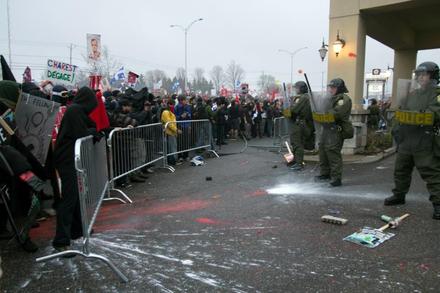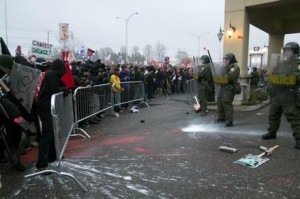Independent groups increase action in Quebec protests


By: Erin Hudson — CUP Quebec Bureau Chief
MONTREAL (CUP) — As anticipated back-to-school/back-to-strike actions draw closer; independent groups are stepping into the spotlight to take on more prominent roles in on-the-ground organizing in the resistance against tuition hikes.
Throughout the course of the six month-long student strike in Quebec, the four major student federations represented students to the government and media. But the protests and actions occurring in the streets, ending often in clashes between students and police, were planned and executed not by the federations, but independent groups.
The looming application of Law 12 this August has tied the hands of larger, officially-recognized student federations such as CLASSE, FECQ, FEUQ and TaCEQ as the federations would face fines up to $125,000 if found in violation of the law.
As the likelihood of the application of the controversial law increased over the summer — Montreal police released guidelines on how the force will be enforcing the law last Friday — many independent groups have publicly stepped out to take on organizational roles.
Independent groups like Les Réseaux, Les Théoriciens and L’Ordre du Carré Noir, or the Order of the Black Square, have assumed prominent roles in organizing demonstrations throughout the strike, each group with its own history in the context of the student movement.
The groups co-organized back-to-school mobilizations such as Operation Firewall, an action set to occur on August 13 where days of disruption will take place in different locations across Quebec.
The theorists
Les Théoriciens formed in 1968 out of the student movement at the time, “Rendez-vous ‘68” movement, which was comprised of a month-long student strike in Quebec CEGEPs. Since its inception, Les Théoriciens’ operations has changed hands between various generations of Quebec students.
The group aims to document the ideological motivations fuelling the student movement and various ideas informing the movement. Members file reports on the events and atmosphere of demonstrations around the province, and write short articles for distribution online and through social media.
But Les Théoriciens have become more hands-on as the strike has progressed.
“Our activities have departed a bit from our comfort zone of writing texts et publications, and we’re moving more towards the more active we could say,” said a member of the group who goes by “Silence.”
According to Silence, Les Théoriciens have made their organization more accessible to get involved in and the group has begun to focus on recruiting Théoriciens with “on the ground” experience in organizing actions.
“It is certain that experiencing the degree of force, police brutality and profiling has radicalized us,” he added.
“Before [Law 12] Les Théoriciens were less involved in the active side of organizing however, we think that to say no to [Law 12] it’s necessary to act contrary to the law,” he explained.
Though Law 12 is a major cause for resistance, the law prompts independent groups such as Les Réseaux and Les Théoriciens to assume a more important and intensive role in organizing actions in the strike, said Silence.
“The big federations like CLASSE, FECQ, FEUQ, TACeQ and all other official groups cannot call for actions against Bill 78 or civil disobedience,” he said.
“If [independent groups] protect themselves, it’s only individuals who will face consequences. In fact, the groups are not registered associations nor a recognized forum nor requiring codification so therefore the law doesn’t apply to them,” he said. If needed, Les Théoriciens would use legal services under CLASSE, though the group has never needed to yet, according to Silence.
Individual liabilities for contravening Law 12 include fines ranging from $1,000 to $5,000 depending on the severity of the violation and history of offending.
The anarchists
The Order of the Black Square is also working alongside Les Réseaux and Les Théoriciens in August operations. The Order is a group of anarchist organizers — a first for the student movement’s organization slate, according to some of the Order’s members.
“The symbolism of the black square is affiliated with several causes … most of those who wear it to show themselves to be mentally at war with the government,” said members of the Order in a group interview. “With student struggles, many youth identify as anarchists or anarcho-syndicalists which is where the movement of the black square comes from.”
Five of the founding members of the Order agreed to be interviewed in an instant messaging chat so as to preserve their anonymity. The five members described themselves as anarchists who met in cégep and started the order in collaboration with “elders” whom the Order will consult as they have experience with anarchist organizing from around the world.
In their interview, the Order claimed responsibility for organizing the May protest-cum-riot in Victoriaville Quebec among the list of actions they have organized.
However, despite their ability to mobilize large actions, the Order does not feel they are vulnerable to the implementation of Law 12 either.
“It will become ‘more dangerous’ for us and mean more profiling will be one by police,” members said. “It will for sure affect us regardless as demonstration are declared illegal quickly and we are breaking the anti-mask law as well.”
The anti-mask law is a municipal by-law in effect within the territory of Montreal which prohibits masks being worn at protests and declares any assembly of fifty people or more illegal if their itinerary is not submitted to Montreal police.
The members alleged that two among them had already been subject to questioning for twelve hours by the Sûreté du Québec and Montreal police.
They also noted that not everyone is open to anarchist perspectives. “We are often insulted by students even projectiles thrown at us …. So we do our best to participate where we are respected and it’s certain that there is fear of us — people think we are mindless casseurs [rioters].”
Instead, the Order operates based on ongoing debates and discussions as demonstrations occur. “In demonstrations, ‘The Black Bloc’ is always the same — there are always the same Montreal militants present … we listen to all points of view.”
The Order connects with people via Facebook and will discuss putting ideas into action through online chats where all participants are anonymous.
Police surveillance?
According to Lafrenière, there are two possible channels through which the SPVM learns of actions which often are publicized through social media; media relations gathers the information through people who approach the police with information or tag @SPVM on Twitter, or the SPVM’s intelligence.
When asked if the SPVM monitors certain groups’ activities on social media platforms, Lafrenière said the force receives “a lot of information from different sources.”

